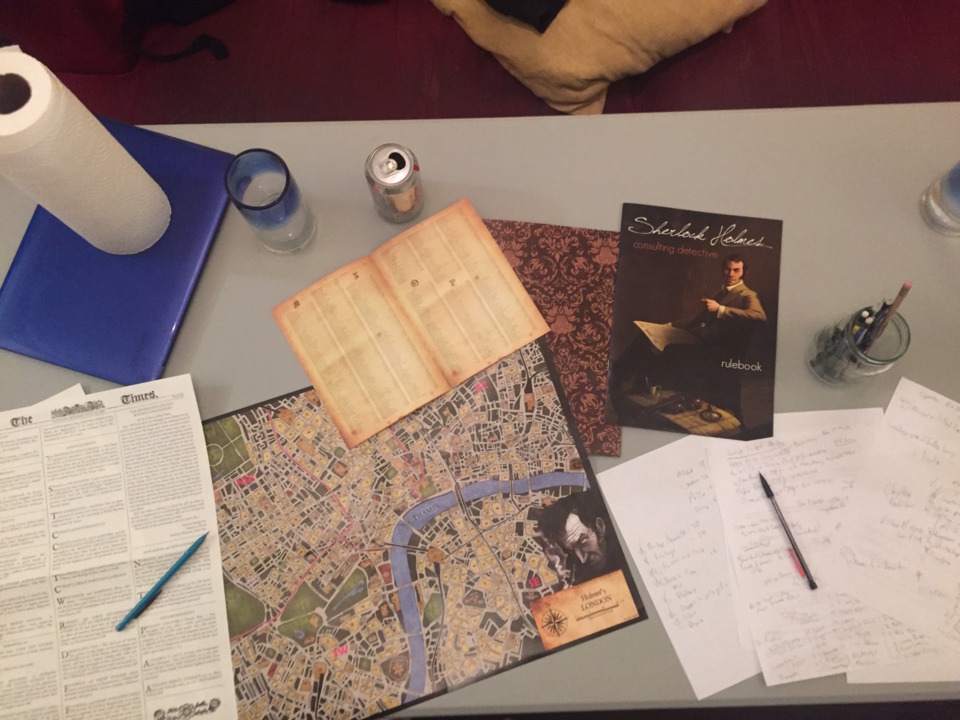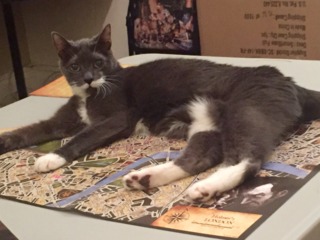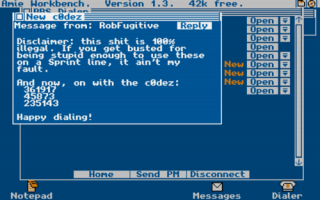Welcome to Off the Clock, my weekly column about the stuff I've been doing while out of the office. This weekend, I spent my free time…
Solving Mysteries

After years of trying to find an affordable copy of Sherlock Holmes: Consulting Detective (plus a handful of friends willing and able to play with me), I finally got the opportunity to dig into this classic mystery/adventure game. (There's an FMV adaptation of the board game, too, but I don't really have any experience with that.)
For the uninitiated, Sherlock Holmes: Consulting Detective casts the players as the Baker Street Irregulars, a group of misfit investigators that Holmes occasionally relies on for information gathering and reconnaissance. At the start of the game one player reads aloud from a case booklet, setting up a murder or a theft or some other mystery that needs to be figured out. Once the introduction is over, players race against Holmes to try and solve it.
How do you do that? Well, you do what any good investigators would do. You roll out a map of London, peruse the day's newspaper, and flip through a hefty “directory”--sort of like a phone book--and decide where in town to go. Every building in town has a designator (Buckingham Palace is SW35, for instance), and when you decide where you want to go you, you open the case booklet to that designator and read the text that’s written there. It could be a long, multi-page interview with a suspect or a short paragraph about something (seemingly) irrelevant to your investigation. Sometimes it’s nothing at all… whoops. Once you think you have a handle on what happened, you turn to the end of the case booklet and try to answer six questions posed by Holmes about the crime (and its adjacent intrigues). You get points for getting the answer right and lose points for taking more turns (that is, visiting more points on the map) than Holmes did.
None of this would work if the mysteries were simple riddles (or even complex logic puzzles). If all you had to do was gather the evidence and line it up nicely, SH:CD wouldn’t produce that special sensation that you get when you finally do figure something out. You can’t have the feeling of finding a needle in a haystack without the hay, and you can’t feel like you’ve unraveled someone’s carefully guarded secret life without their life feeling messy and filled with irrelevant details.

It’s really hard to overstate the breadth of information available for you to find in any individual case. In our first game, the CEO of an arms manufacturing company was found dead in an alley outside company headquarters, and even after visiting multiple locations and getting what we thought was a fair amount of information on the case, we still had a lot of questions. Was the killing due to internal strife at the company? Was it tied to international corporate or military intrigue? Was a scorned lover involved, and if so which one? Each of these questions emerged out of multiple investigation points, seated carefully in a variety of sub-stories and character perspectives.
The first time through, we played with the intention of “winning” the game--largely because the Holmes of SH:CD is just as smug as his literary original. So, after just 10 turns, we convinced ourselves that we knew what happened and we went back to 221B Baker Street. We flipped to the back of the book, answered Holmes’ questions, read his solutions and realized that we could not have been more wrong. Whoops, again.
It was a learning experience, not only because we understood the game better, but because we learned what we wanted from the game. So we started the second case (this time about the death of an octogenarian general, the Battle of Waterloo, and… a jewel heist? Maybe?), and we decided to take a much less competitive attitude. In a sense, we were playing it the way many played Her Story, the database driven mystery game that got a ton of attention earlier this year. We weren’t racing against Sherlock, we committed to investigating until we were satisfied. (And, for the record, we still got things wrong. Don’t hire us as your detectives, I guess.)
Honestly, it’s hard not to compare SH:CD to Her Story. Both are games that feature open-ended investigation, and SH:CD is a keen reminder that Her Story shouldn’t be lauded simply for being “fresh," either. As Twitter user @VorpalFemme pointed just after it released, Her Story is not the first game on the market to feature database diving and non-linear storytelling. She notes that Christine Love’s Digital: A Love Story and Analogue: A Hate Story both let players dig through e-mail correspondence in a way similar to Her Story’s faux-desktop detective work. Taken more broadly, Emily Short's Galatea and First Draft of the Revolution offer unique takes on interactive exposition that blur the line between narrative "exploration" and authorship. And on a recent episode of Idle Thumbs, Nick Breckon realizes that Ancestry.com's uses "multiplayer" hooks and game-y reward systems to encourage a similar sort of "one-more-click" style of play.

It’s easy to find ourselves saying something like “Game X has done something no other game has done before,” but we should be careful of making those sorts of claims. The structure of the industry has historically made it easier for some games to “pierce” into the wider consciousness than others, and (though it’s a constant challenge) we should do our best to broaden the scope of our knowledge about the medium instead of making hyperbolic claims about originality. Beyond that, though, we should also do more than just say “this game is good because it does something new," since boiling any of these games down to their novelty alone does them a disservice. Instead, we should engage with their specific qualities. How do they execute on the concept of non-linear storytelling? What particular feeling does investigation create for the player in these games?
In the case of Sherlock Holmes: Consulting Detective, it is the game's quality of materiality that distinguishes it for me. It’s the feeling of flipping through pages, pointing at spot on the shared map on a table, measuring the distance traveled by a suspect to see if their alibi adds up. It’s even the fact that “the answers” exist in the book, waiting to be seen, constantly tempting your eyes. When I say “materiality,” I mean more than just the game’s physical attributes, too: Even the way the game is designed feels, somehow, touchable and real. For instance, as you complete cases, previous newspapers remain “in play”--in the second case we found an important clue in the broadsheet from in-game months prior. Your knowledge about the city and its inhabitants increases as you play, too, and it’s easy to find yourself slipping into character: “Well… We do know that guy at the city records department… Maybe he could tell us something?”
It’s a more objective-oriented mystery than Her Story and a less emotional one than Analogue, but it took me over in a way that neither of those games did. To lift a term from virtual reality marketing, it’s a game with presence. Just as, in the Elite: Dangerous VR demo, I forgot for the slightest moment that the pilot's hand wasn’t actually my hand, there were moments playing Sherlock Holmes: Consulting Detective where my brain's neurons fired in a confused pattern, so certain that I was cracking a real, important mystery wide open. Brief moments, yes, but intense all the same. A quarter second here, where I realize that someone’s alibi doesn’t add up; a half second there, when the evidence I’ve been hoping to find for the last two hours first springs into view; the length of the grin I gave my friend as he read the damning witness testimony aloud.
So far, I’ve worked through two of the game’s ten cases. That means there are eight more mysteries to solve... plus an expansion due sometime in 2016. I cannot wait to dive back into the streets of London again.
A quick question for you all, though: So much of my experience of Sherlock Holmes: Consulting Detective changed when we decided to focus on solving the mystery instead of just trying to beat Sherlock's score. Do you have any gaming experiences where, because you shifted your focus/goals, your experience was greatly improved? Maybe you lowered (or increased) the difficulty in an FPS or maybe you decided to play as a different class in an RPG? Maybe it's even about who (or where, or when) you decided to play something? Let me know!
Oh, and because our answers have been so good every week, I'm going to start grabbing a handful of my favorite comments and highlighting them in a post every Friday afternoon! If you'd prefer your answer not to be included in that post, let me know and I'll respect that.
I also spent some this time this week...
Listening to: "Sunshine" by Pusha T
Reading: "Get rich or die vlogging: The sad economics of internet fame" by Gaby Dunn
Watching: Rifftrax's Star Wars Holiday Special Commentary (Go for the Wookies, stay for the 70s TV ads).
110 Comments